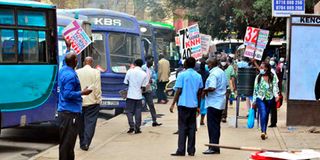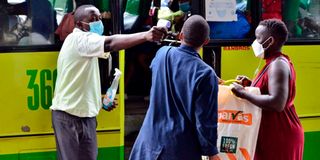Premium
Matatus owners: Why we will not reduce fares despite resuming full capacity

A matatu picking passengers in the middle of the road.
Passengers who thought there may be fare relief after matatus across the country resumed full capacity are currently experiencing disappointment.
This is after public transport operators across the country, who are back to filling all their seats after a directive from the transport ministry last Friday, are still charging the same fares.
A number of passengers were surprised when they ended up still having to dig deep into their pockets for their daily commutes.

Various matatu crews at Kencom in the Nairobi CBD on August 10, 2021.
High costs
Matatu Owners Association chairman Simon Kimutai, while welcoming the directive, now blame the high cost of fuel for keeping fares high. Additionally, he says, owners have lost a lot of income since the pandemic began.
“We will not reduce fare because fuel price went up the other day and with the kind of revenue we were getting at 40 per cent, it was unsustainable and the industry was collapsing. Many people have left the sector, jobs lost, vehicles auctioned among other negative impacts. We will play our part in observing the new protocols,” said Mr Kimutai.
His sentiments were echoed by the chairman of the Association of Bus Operators Edwin Mukabanah, who said that “fares in Kenya are subject to market forces of demand and supply.”
“If you reduce carrying capacity, vehicles become less as they carry fewer passengers. We hope fare will naturally come down,” he said.
Matatu owners, however, have promised that they will enforce other health measures such as using sanitsers and insisting that passengers wear face masks.
While this is mostly being observed, a spot check by Nation.Africa in Nairobi found that this is not always adhered to strictly.
For instance, on Monday and Tuesday, many matatu saccos operating in the city centre, especially Nissans, did not have hand sanitisers as was prescribed at the beginning of the pandemic. Crew from bigger transport companies like City Hopper could be seen screening passengers using temperature guns and employing hand saniters before allowing passengers in.

A crew member with Citi Hoppa bus company screens passengers at Kencom on August 10, 2021.
In addition, it is an open secret that some matatus are already overloading passengers to make more money.
Emmanuel Atuya, a city resident who uses Thika Road matatus, told Nation.Africa that wishes the government did not allow full seating capacity since the fare is the same.
"Tukae na space juu fare bado ni the same (We should have space since the fare is the same). We need our comfort as we are the ones who are paying.”
An operator with MSL Sacco buses plying the Kasarani route, Peter Kariuki, insisted that matatu owners have no intention of lowering fares, saying such a move would be counterproductive.
“There is no way the fare will be reduced because fuel prices are still high. If the government reduces the fuel prices then we will do the same. Matatu owners will be hurting if they reduce the fare,” he said.
Public Service Vehicles (PSVs) have been operating at 60 per cent capacity since the pandemic began. 14-seater matatus were allowed to carry a maximum of 10 passengers while a 33-seater bus could have 18 passengers including the driver and crew.
Health Secretary Mutahi Kagwe introduced the 60 per cent rule on March 20 last year when there were only seven Covid-19 cases in the country.
However, President Uhuru Kenyatta had on March 12 this year directed that old Health protocols that hurt the economy be reviewed.





